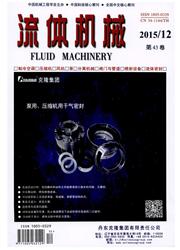

 中文摘要:
中文摘要:
In this paper, a novel study on performance of closed loop pulsating heat pipe(CLPHP)using ammonia as working fluid is experimented. The tested CLPHP, consisting of six turns, is fully made of quartz glass tubes with 6 mm outer diameter and 2 mm inner diameter. The filling ratio is50%. The visualization investigation is conducted to observe the oscillation and circulation flow in the CLPHP. In order to investigate the effects of inclination angles to thermal performance in the ammonia CLPHP, four case tests are studied. The trends of temperature fluctuation and thermal resistance as the input power increases at different inclination angles are highlighted. The results show that it is very easy to start up and circulate for the ammonia CLPHP at an inclining angle.The thermal resistance is low to 0.02 K/W, presenting that heat fluxes can be transferred from heating section to cooling section very quickly. It is found that the thermal resistance decreases as the inclination angle increases. At the horizontal operation, the ammonia CLPHP can be easy to start up at low input power, but hard to circulate. In this case, once the input power is high,the capillary tube in heating section will be burnt out, leading to worse thermal performance with high thermal resistance.
 英文摘要:
英文摘要:
In this paper, a novel study on performance of closed loop pulsating heat pipe(CLPHP)using ammonia as working fluid is experimented. The tested CLPHP, consisting of six turns, is fully made of quartz glass tubes with 6 mm outer diameter and 2 mm inner diameter. The filling ratio is50%. The visualization investigation is conducted to observe the oscillation and circulation flow in the CLPHP. In order to investigate the effects of inclination angles to thermal performance in the ammonia CLPHP, four case tests are studied. The trends of temperature fluctuation and thermal resistance as the input power increases at different inclination angles are highlighted. The results show that it is very easy to start up and circulate for the ammonia CLPHP at an inclining angle.The thermal resistance is low to 0.02 K/W, presenting that heat fluxes can be transferred from heating section to cooling section very quickly. It is found that the thermal resistance decreases as the inclination angle increases. At the horizontal operation, the ammonia CLPHP can be easy to start up at low input power, but hard to circulate. In this case, once the input power is high,the capillary tube in heating section will be burnt out, leading to worse thermal performance with high thermal resistance.
 同期刊论文项目
同期刊论文项目
 同项目期刊论文
同项目期刊论文
 期刊信息
期刊信息
